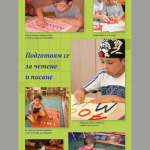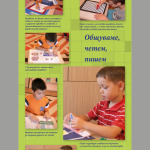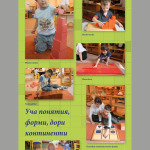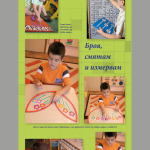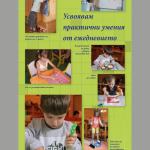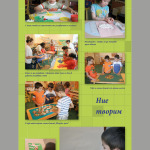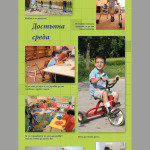Inclusive society for inclusive education

The project purpose is Karin Dom, in cooperation with the Municipality of Varna, to catalyse the stage of the transition to inclusive education in Varna Municipality. It will be realized through developing close partnerships with mainstream schools and kindergarten; training and presentation of the effectiveness of the child centered approach and the focusing on the children’s potentials as the core idea of their inclusion.
The main objective of the project is to create a pilot model which will change perception on inclusive education for children with special educational needs, through building capacity and raising awareness in the mainstream schools and kindergartens and the wider society.
Planed activities:
- Study and assessment of the knowledge and the perceptions of the mainstream teachers and local authorities concerning the process of inclusive education;
- Training for Karin Dom’s specialists in mentoring mainstream teachers;
- Internship trainings for mainstream teachers from kindergartens and primary schools for sharing the inclusive practices at Karin Dom;
- Cascade trainings for mainstream teachers from kindergartens and primary schools;
- Raising awareness/promotion for mobilizing opinion in favour of inclusive education – round table discussions with state and local authorities and NGOs, press-conference, open days at the mainstream kindergartens and schools for involvement the families of children with special educational needs in the process of inclusion, information campaign including brochures, mobile exhibition, resource library and DVD film.
Analisys:
of the attitude of mainstream teachers, participating in the project Inclusive Society for Inclusive Education, towards inclusive education and the opportunities for development of inclusive practices in kindergarten or school.
First was examined the attitude towards inclusive education of the group of 20 teachers from kindergartens and school, who took part in the mentor program of Karin Dom Foundation within the project. Then, the attitude towards inclusive education of some of their colleagues, from the 20 kindergartens and schools involved in the project, was generalized.
Teachers who participated in the mentor program
The Practicum Participation Inquiry was completed by a total of 22 respondents among which 10 were teachers from kindergartens, 11 were teachers, and 1 a pedagogical advisor from schools in the Municipality of Varna.
The experience of teachers and their motivation to raise information and promote their skills in working with children with special educational needs was also reflected in their responses related to their understanding of inclusive education and the description of their experience in the field. All of the respondents used correct political terms in describing the definitions.
In the definition for inclusive education, most of the teachers included terms, such as integration, socialization, adaptation of children with special educational needs. These terms are typical of integrated education where children with special educational needs must adapt to the system and not the system to be consistent with the needs of different children. Among some of the responses there appeared the term active inclusion of children with special needs, which shows understanding of the need for the inclusion of children with special needs and not only their physical presence in the kindergarten or school.
According to the teachers, their colleagues from mainstream schools and kindergartens are not well qualified and do not have motivation to work with children with special educational needs. They recommended their colleagues also undergo a similar training and practicum at Karin Dom Foundation.
Teachers who participated in cascade trainings
The feedback questionnaire from the cascade trainings was completed by a total of 225 respondents among which 104 were teachers from kindergartens and 121 were teachers from schools in the Municipality of Varna.
The attitude towards inclusive education and the experience of teachers in the education of children with special needs is different. The opinion, that these children should be in a mainstream school, despite the difficulties which teachers face, predominated. According to some teachers, there is no problem for them to accept these children, but the problem comes from the parents of regular kids. Some teachers thought the problem is not about acceptance, but about education of children with special educational needs. This statement was confirmed also by the answers to the question on the difficulties for inclusive education.
The work on changing attitudes, both among teachers from mainstream kindergartens and schools and parents of children without special educational needs, must be continued.
Cascade trainings conducted within the project achieved their objectives and provoked discussion among the participants. It is a good thing for such an activity to be continued under the form of a workshop for teachers in the mainstream school or kindergarten.
Difficulties for inclusive education and opportunities for development of inclusive practices according to the participants in the project
The main difficulties and suggestions are:
- The majority of difficulties, reported by teachers from kindergartens and schools, for inclusive education are connected exactly with the shortage or lack of some of the main components of supportive environment.
- Lack of synchronization between the main teacher and the resource teacher. Providing resource teachers and their work with the mainstream teacher is still presents a lot of difficulties, according to the participants in the project.
- A need for further qualification and training of teachers from mainstream schools and kindergartens in working with children with special educational needs.
- A need for special materials and equipment for working with children with special educational needs.
- Many teachers indicated the insufficient training of teachers on working with children with special educational needs as another major problem. They reported that there was no information or methodological guidelines on how to work with these children and how to react in particular, specific situations.
Opportunities for development of inclusive practices
The following ideas for development of inclusive practices are presented in the context of the difficulties for inclusive education outlined by the participants in the project:
- Further qualification and training of teachers from mainstream schools and kindergartens on working with children with special educational needs.
- Providing facilities in mainstream schools and kindergartens for working with children with special educational needs.
- Providing information and specialized literature on working with children with special educational needs.
- Change of attitudes towards inclusive education aimed at teachers and parents of children without special educational needs in mainstream kindergartens and schools.
Karin Dom Foundation has a long-term experience in changing attitudes towards children with disabilities. The public attitude has been changing in recent years and from a taboo it has become subject to public discussions. According to the opinion of the participants in the project, there emerges a need for a targeted campaign aimed at parents and teachers in mainstream schools and kindergartens. Such an initiative is suitable for a consortium of NGOs and institutions working with children with special educational needs, where the campaign lasts longer and includes various activities.
Implementation period
March 2010 - December 2010
Financed by
Open Society Institute, Budapest



